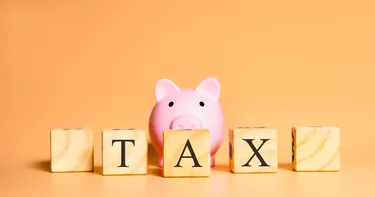
Tax planning is "any action in which tax consequences are considered," according to the University of California Hastings College of the Law. In other words, you take steps to avoid giving the IRS any more of your hard-earned dollars than you absolutely have to.
Tax planning strategies can involve timing what you earn and timing what you spend. But it depends on having an understanding of what tax breaks the IRS allows and how various rules work in your tax situation.
Video of the Day
Video of the Day
The Benefits of Planning
Tax planning can reduce your tax liability, but taking various tax strategies into consideration can also help you budget and handle your personal finances for maximum tax efficiency. Maryville University points out that taxpayers can not only avoid paying more tax dollars than they have to, but penalties and interest added onto their tax bills as well when they understand what tax payments they must make and when those tax filings are due.
Tax-Planning Steps: Your Withholding
Your first step toward getting tax-organized and creating a plan is assessing your financial situation. You probably have your take-home pay committed to memory down to the dime, but that number doesn't help you plan the best approach to reducing your tax burden, at least not by itself.
Assuming that you are not self-employed, you're giving the IRS money that you could otherwise be spending on your family's needs if you're getting a walloping tax refund every year. That's just the IRS returning your paycheck withholdings to you without interest. Or maybe you end up owing the IRS each year when you file your tax return. This is where those tax penalties can kick in. The IRS doesn't like to wait for its money. It wanted its share out of each of your paychecks.
This discrepancy is easy to fix. The IRS offers a tax withholding estimator on its website. Plug in your information and the IRS will tell you how much in the way of taxes you should be having withheld from your paychecks. You can fill out a new W-4 for your employer to get your withholding just right. Then, adjust your financial plans accordingly.
Keep Those Receipts
Dedicate a place in your home to catch everything that has to do with your finances as the year goes by. No, you don't have to maintain every coffee receipt, but you'll want to keep records of anything you pay for that's potentially tax-deductible. A computer file can work the same way. The point is to have everything at your fingertips when the last months of the year roll around so you can make some adjustments to save you the most income tax dollars by the end of the tax year.
Standard vs. Itemized Deductions
December is your tax-planning sweet spot. This is when you can gather up all that documentation and information you've been saving all year and use it to your best advantage before tax preparation begins.
First, acquaint yourself with all the itemized deductions that are available and the rules that apply to them. The IRS suggests taking a look at Schedule A, which lists them. They include things like medical expenses, including health insurance premiums and home-associated expenses, such real estate taxes or mortgage interest, which can really add up.
Your goal is to determine whether you spent more on these expenses over the course of the year than the amount of the standard deduction that you're entitled to claim for your filing status. Your standard deduction is $12,950 in 2022 if you're single. You'll save money if the total of your qualifying deductible expenses for the year comes out to $12,951 or more and if you itemize instead of claiming the standard deduction. All these deductions subtract from your gross income to arrive at your taxable income.
Income and Expenses: December or January?
Compare your income this year to what you expect it to be next year. TIAA suggests that you still have time at year's end to reduce your income by contributing to a retirement account, which can potentially earn you another tax deduction. Or consider making a charitable contribution. This is deductible, too.
U.S. Bank suggests doing some tax-loss harvesting if you have investments, intentionally taking a loss with certain stocks or mutual funds to offset others that have produced a great deal of taxable income. But you'll want to speak with a CPA or other tax professional before you do this because a lot of rules apply and capital gains taxes are involved in this strategy. It doesn't apply to IRAs.
Consider asking your employer to hold off on giving you that year-end bonus in January if you expect your overall income and top tax bracket to be less next year. Or get a last-minute jump on those itemized deductions by spending in December rather than postponing medical care and expenses until January. This works in reverse, too. You might be able to postpone spending on something that's deductible until January if you think your income is going to be more next year and your tax rate will be higher so you'll need the deduction to reduce the amount of taxes due more then.
- IRS: Start Planning for Next Year’s Taxes
- TIAA: 5 Year-End Tax Planning Strategies to Consider Now
- U.S. Bank: 6 Year-End Tax Planning Tips
- University of California Hastings College of the Law: Lower-Income Tax Planning
- Maryville University: Tax Planning Strategies: Tips, Steps, and Resources for Planning
- IRS: Steps to Take Now to Get a Jump on Your Taxes
- IRS: Tax Withholding Estimator
- IRS: IRS Provides Tax Inflation Adjustments for Tax Year 2022
- IRS: Schedule A Itemized Deductions